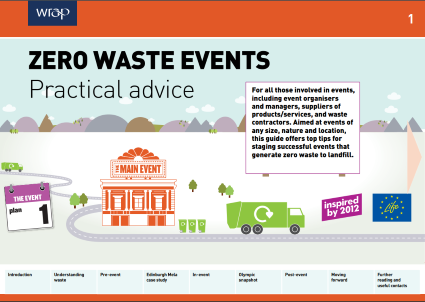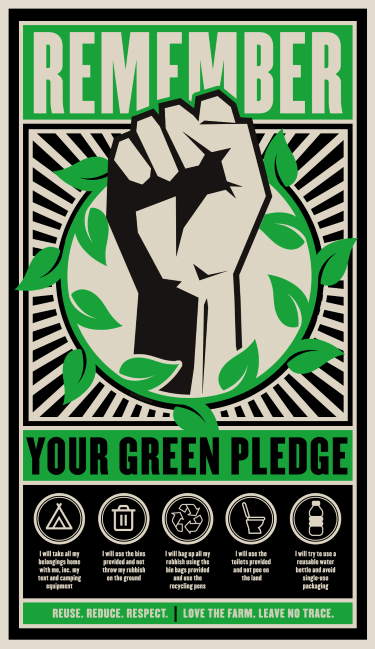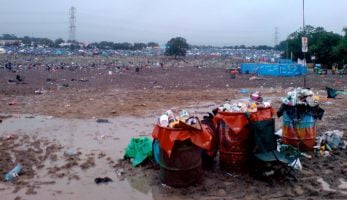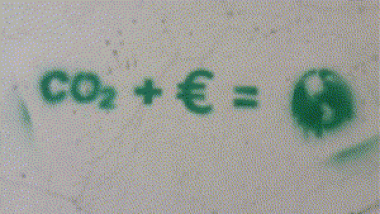The idea of Zero Waste Events is spreading. Sustainability is becoming a mainstream concept within most organisations and communities across many nations. It's also becoming much easier to run “Zero Waste to Landfill” events. The purpose is to raise awareness of the impact of their waste among the guests/ attendees, and actually reduce the waste sent to landfill. It's also getting easier. There are more waste companies that provide this service, and better guidance is available.

UK government funded organisation WRAP provides a free ebook “Zero Waste Events Guide” as being:
“For all those involved in events, including event organisers and managers, suppliers of products/services, and waste contractors. It's aimed at events of any size, nature and location. This guide offers top tips for staging successful events that generate zero waste to landfill.”
An example of such an event was the 2012 Olympic and Paralympic Games. It was a major-event first globally when the organisers achieved zero waste to landfill. Scroll down to bottom for he resource link.
Zero Waste Event – A Definition
Any event, at which event organisers and managers, suppliers of products/services, and waste contractors endeavour to divert waste, by observing the waste hierarchy. The waste is diverted away from being placed in a landfill is 90% or more. If alternatively, some waste is sent to energy extraction (e. g. a non-hazardous/ household waste incineration facility) it will be no more than 10%.
These events may be of any size, nature and location.
Background
The steady expansion of recycling, commercial composting infrastructure, and even biogas plants for food waste makes it possible to offer recycling and food composting at events in most locations. Zero Waste Event organisers are sharing best practices. They have also been developing new ways to divert event materials from landfills.
Zero Waste France made the case for sustainable events, very eloquently when they said:
Organising an event, and thus gathering participants, material and energy in the same place and for a short period of time, can affect the environment and natural resources. According to Ademe, the French Agency for the Environment and Energy Management, an average event of 5,000 people generates 2.5 tonnes of waste, uses 1,000 kWh of energy and 500 kg of paper (Source: guide des éco-manifestations en Poitou-Charentes (French)).

That's a significant amount of any type of waste. But, as event wastes usually include a large proportion of food waste this material is at the same time more damaging in a landfill than other wastes, but potentially more useful. That's because food waste is the worst for creating landfill leachate, and the most landfill gas. The leachate tends to hang around to escape into the ground causing water pollution. While the gas becomes a potent greenhouse gas. It's a fact that even if the landfill gas is collected and used, a lot still escapes.
But, on the plus-side. Event waste with its high food waste (organic content) holds a high calorific content which is digested in a biogas plant will produce a surprisingly large amount of biogas. That biogas can replace fossil fuel use, thereby in a small way reducing the need to use fossil fuel energy.
The Sustainability Challenge for Music Festivals
The complexity of planning a Zero Waste Event varies as much as the events themselves. A community barbecue of environmentally minded party-goers may not need much, if any policing to be free of waste which must be landfilled. But, music festivals and many sports events would be far more onerous task.
It would require many marshals to prompt the attendees to recycle properly at most sporting events. At festivals there is an additional challenge when the fans depart. A huge burden on the festival organiser can remain when attendees fail to remove tents (usually non-recyclable) and fail to segregate recyclables with care, at all recycling bin points throughout the event.
An example of current best practise in large music festival sustainability is the Glastonbury 2020 website. They require all that attend to sign-up to the Festival’s terms and conditions of entry when paying for their balance.
Glastonbury Festival goers must sign a Green Pledge.
Planning a Zero Waste Event
For all those interested in planning a zero waste event there are some tips which to bear in mind.
Forward Planning
Detailed planning is essential for successful zero waste events. The first action must be to produce a waste management plan for the event detailing all the types of waste which will be generated. This is not an easy task for non waste professionals, but the exercise is a necessary first step. If necessary there are specialist consultants who will do this for the organiser. However, with careful thought and the ability to ask questions of suppliers and the companies who will be entrusted with removing the waste, most people are well able to do this. Waste professionals use the so called waste-hierarchy in their planning. Waste hierarchy's do vary between nations but in essence set a descending sequence of desirability to the possible destinations for waste.
Apply the Waste Hierarchy! – It Helps to Make Wise Choices During Waste Management Planning

The most desirable action is to find ways to avoid waste the event will produce in the first place. It's the time when organisers can think outside the box. For example, ice creams can be served without wrappers if the selection is limited to traditional wafers and cones.
Next, minimise the waste. Can tickets be kept small, or a reduction offered on attendance on the next event if the ticket includes a coupon which in order to be used require the ticket to be taken home?
When minimised the opportunities for re-use are next considered. The obvious one here is to provide only traditional crockery, and cutlery which will be hired for the event, collected and washed afterwards.
Next down the heirarchy is to ensure the remaining items will be recyclable. There will most often be some items which for good reason, will need to be single use/ plastic such as drinks glasses and mugs. In such cases, ensure that those are at least made from plastics termed as “commonly recycled“.
In the waste plan, first think about everything that will be needed on-site. Having listed the supplies needed, seek out product sources which will be recyclable.
Check with the appointed waste disposal company or companies that they are able to recycle the chosen materials. “Commonly recyclable” means just that. Your waste company may not be able to recycle any particular item. Even those items which will be, by necessity single-use plastic wrapped, can usually be recycled if the right choice is made at an early enough stage in planning.
Specialist Eco-products Packaging Suppliers

It is often a good starting point to check out the eco-products available in specialist stores.
If traders will be selling on-site, discuss the waste plan with them. You may need to make their presence conditional on their only being permitted to use recyclable packaging etc., compatible with zero waste events. Show them that suitable eco-packaging is commercially available for them to use, from the eco-products available.
Take care not to forget the many, and varied, types of waste generation which will occur in kitchens, toilets, waste bins, and at all food stations.
U.S. Zero Waste events supplier, Eco-Products, Inc. (based in Boulder Colorado) provides food and food service items at party events and lists over 50 U.S. events served by them. They offer to source all zero-waste compatible items for events. via www.zerowasteevents.com
Step-by-Step Guide to Zero-Waste Events Offered by GreenBiz in the U.S.
On the GreenBiz website they challenge you as an events organiser to make it personal. Make it your personal responsibility to make zero-waste events your company's new norm!
They were involved in the following two “ZeeWee” events:
- Second Nature's Presidential Climate Leadership Summit in 2017, diverted 203 pounds of compost and 38 pounds of recycling diverted from landfill.
- 2018 Higher Education Climate Leadership Summit, held at the Doubletree Tempe, diverted 110 pounds of compost.
Since then, they've translated their lessons learned into best practices which they share with all website visitors in their Step-by-Step Guide to Zero-Waste Events.
Framework for Zero Waste
It's a general framework for zero waste that they say can be modified for any type of event or venue.
Reproduced below are some highlights:
“I recommend keeping the composting at the back of house, making contamination much less likely. Teaching 20 kitchen staff proper food disposal methods has less room for error than trying to bin guard for hundreds of party goers.”
“Know your waste, which means knowing your inputs and materials. The specific waste facilities you are working with, must be researched. Check for what can be recycled and composted in your area.”
“Share why what they are doing matters and that their efforts really do make a difference.”
“Bin guarders are not optional. If you leave it up to the attendees to dispose of their waste, it is crucial that you have bin guarders and signs.”
“Make it known to the attendees that it is a zero-waste event.”
Read more at www.greenbiz.com
A 2nd U.S. Zero Waste Event Service
On their website they say that any event, large or small, can be a Zero Waste Event. They provide assistance to enable organisers plan their large-scale Zero Waste Event.
Bin layout and design is a crucial aspect to successful pre-sorting by the event attendees. This company has a collapsible Zero Waste bin arrangement.
They say that they primarily serve events in Boulder county, but also operate in neighbouring counties, including Denver. via ecocycle.org
ZeroWasteEvents UK – Event Waste Management Throughout England and Wales
 ZeroWasteEvents is a company which describe themselves as providing event waste management throughout England and Wales. They've been doing this since 2011. Back in 2016 they comment that even at that time the Ludlow Food Festival produced 59 skips of waste. But they threw away only 2 skips to landfill.
ZeroWasteEvents is a company which describe themselves as providing event waste management throughout England and Wales. They've been doing this since 2011. Back in 2016 they comment that even at that time the Ludlow Food Festival produced 59 skips of waste. But they threw away only 2 skips to landfill.ZeroWasteEvents UK clients include: Abergavenny Food Festival, Bike4Life, Cosford Air Show, and the Ludlow Food Festival. Also, the Hay Literary Festival, Llangollen International Music Eisteddfod, and Shrewsbury Food Festival have been clients. Read more at www.zwevents.org.uk
Finally, last but not least there is a useful resource on the topic as follows:
WRAP Zero Waste Event Guide
UK government funded organisation WRAP provides a free Event Resource Management Plan (RMP). It's a tool which can help you better understand the implications of waste. via www.wrap.org.uk







Hey, thanks for writing such a nice blog on Waste Management.
DCC is Manufacturing Waste Segregation Plant and other MSW Plants and Machinery. Effective management is the key to best waste management systems and thus the plants must be operated by highly professional and trained manpower.